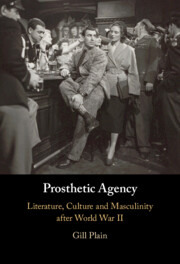Chapter 3 - Bad Science
Nigel Balchin and the Limits of Technological Man-Making
from Part I - Technology
Published online by Cambridge University Press: 29 June 2023
Summary
While technology, in the form of hardware, has excellent prosthetic man-making qualities, science, in the form of brains, has a rather less impressive track record. The fiction of the 1940s and 1950s suggests that the pursuit of science actively disempowers men, rendering them feminised and passive, and positioning their knowledge not as a source of individual agency but as a commodity to be managed, purchased or otherwise controlled. When scientists attempt to take action, they are represented as mad, bad or naïve, acting – and mobilising the threat of their perversely powerful scientific know-how – under the malign influence of politics, religion or ethics. A brief survey of scientific representation reveals variations on this theme.3 In Nigel Balchin’s A Sort of Traitors (1949), foolish young biologist Bob Marriott is led astray by reckless talk of international responsibility and scientific influence, but proves no match for the anarchic guile of an embittered Irish veteran.4 Roy Boulting’s Seven Days to Noon (1950) similarly presents the scientist as dangerously naïve. The faith in his work that once drove esteemed nuclear physicist Professor Willingdon has been replaced by ethical doubt and a religious mania that convinces him he can save the world by blowing up London. The scientists of Agatha Christie’s Destination Unknown (1954), by contrast, seem devoid of ethical awareness, occupying a full range of unpalatable ideological positions from Communism to Fascism to an extreme intellectual nihilism. Fortunately for the world, Christie’s ‘prima donnas’ are removed from circulation to a state of luxury captivity, in a plot that ultimately proves to be less about science than capital. Brains are commodities, and someone wants to corner the market. The scientist as a commodity, to be traded or forcibly acquired, recurs in more ideologically freighted fashion as Cold War tensions progress.5 By the time of Alastair MacLean’s The Last Frontier (1959), scientist Dr Jennings is little more than a parcel passed between east and west. Jennings is no fool, but he is old and vulnerable. A pawn between superpowers, he can only offer passive resistance and await rescue through the prosthetic agency of youth. Between these direct representations lies the scientist as causality. Scientific manipulation of biomatter lurks, ill-defined, behind the malevolent perambulating plants of John Wyndham’s The Day of the Triffids (1951) and scientific product – the atomic bomb – destroys the world, scientists and all, in Nevil Shute’s devastating elegy On the Beach (1957). Shute’s vision of apocalypse indicts political lunacy as much as anything, but the scientists who remain in his dying world are utterly impotent. John Osborne, seconded to the submarine mapping the contours of the surviving world, can only measure radiation – he cannot stop it. For much of the book, he clings to his belief in the value of ‘just finding out’, but, in the end, he seeks agency (and consolation) through that most conventional of prosthetic means: driving a Ferrari around a racetrack.6
- Type
- Chapter
- Information
- Prosthetic AgencyLiterature, Culture and Masculinity after World War II, pp. 111 - 138Publisher: Cambridge University PressPrint publication year: 2023



